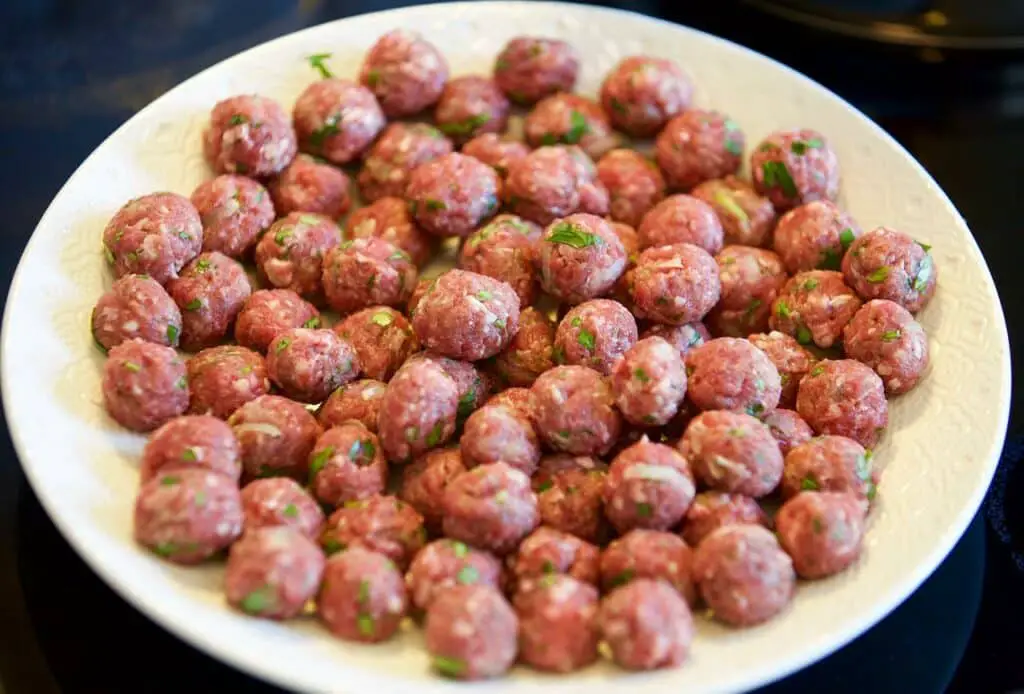Meatballs are yummy, and it’s no surprise your dog might lick his lips at their sight, but not all human foods are good for them.
For you to eat as the dog watches, hoping to get a scrap, is almost unbearable.
While you may want to share every delicious meal with your canine friend, be careful as you may end up causing more harm than good.
Can dogs eat meatballs?
Yes.
Dogs can eat meatballs with a few caveats to avoid detrimental effects from harmful ingredients like onion and garlic.
These two harmful ingredients and salt are the most popular in meatballs, and you need to avoid them at all costs.
Sharing food with your dog is okay, but not everything you eat is safe.
Ensure that anything you give the dog contains safe ingredients for easy digestion.
If you are going to serve your dog meatballs, here is what you need to know.

Are Meatballs Safe for Dogs?
The most common ingredient in meatballs is onion, meat, and garlic.
Don’t give your dog any meatballs without confirming the contents.
Onions and garlic are toxic to dogs, especially if ingested in large amounts, as they break down red blood cells leading to anemia.
Ensure your dog eats healthy food; homemade recipes are ideal for your dog than those you buy from a food store.
A recipe prepared for dogs specifically will ensure they feed on a balanced diet.
Serve your homemade dog meatballs with dog gravy for a more delicious, beneficial experience.

Safe Ingredients for a Dog’s Homemade Meatballs
Preparing homemade meatballs for your dog is best to give them the best you always desire.
There are tons of healthy recipes online you can follow to achieve this goal.
As a result, you’ll have a tasty treat for your pup within no time with the right ingredients.
All you have to do is mix the ingredients, shape them then cook.
Once you finish cooking, serve enough and refrigerate the rest for another day.
If you decide to make a significant batch to last for months, the recipes allow for freezing.
Meat
Meat tops the list because dogs love meat unknown to them; it is the best source of protein.
Make sure it is well-cooked, without spices, and lean.
These three elements make it safe for consumption.
Beef is rich in essential fatty acids, vitamins, and minerals the dog needs to build healthy muscle mass, strong joints, and thick furry skin.
Bread/Breadcrumbs
As a typical meal at home, bread or breadcrumbs is a considerable part of a dog’s balanced diet, although it should eat it in moderation.
However, note that not any bread but plain white, brown, or wholemeal.
Ensure the bread you choose is low in sugar and salt levels without additions like raisins.
Cheese
If your dog is not lactose intolerant, it can enjoy cheese bits.
You cannot give too much cheese because it is high in fat content and calories that contribute to obesity.
Eggs
Full of nutrients and an excellent source of proteins, eggs provide your dog with good nutrition to live a healthy lifestyle.
However, giving the canine too many eggs can cause weight gain.
To avoid messing with your dog’s life, ask a vet how many eggs to include in its diet and how often.
Harmful Ingredients to Avoid in a Dog’s Diet
The last thing you want is to hurt your dog by feeding it something harmful.
For this reason, it is imperative to watch everything that goes into your dog’s meatballs for your peace of mind and its health.
Here is what to keep off your dog’s diet.
Garlic and onion
These two are part of the allium family and are toxic to dogs.
Garlic contains thiosulfate, which dissolves the red blood cells, causing anemia.
Onions have a compound called n-propyl disulfide which also causes red blood cells to break down, leading to anemia.
Black pepper
Seasoning is tasty and beneficial to you, the pet parent but not the pet.
Black pepper will cause your canine discomforts like an upset stomach and nausea.
Salt
Dogs only need minimal salt in their food.
Adding too much salt to a dog’s food will lead to salt poisoning, vomiting, diarrhea, and in severe cases, it can be fatal.
How Many Meatballs Can My Dog Eat?
The number of meatballs each dog can eat depends mainly on weight, health complications and the meatball size.
Keep dogs with health issues like digestive distress purely on a canine diet for dogs.
Avoid giving it human food that has the potential to interfere with its prevailing health condition.
Prepare meatballs from lean meat by baking or broiling rather than frying.
Serve one meatball weekly to small dog breeds and 2 – 3 for larger dog breeds.
Frequently Asked Questions (FAQs)
Can dogs eat meatballs in tomato sauce?
No, dogs can’t eat meatballs in tomato sauce because there might be unsafe ingredients like salt and spices.
When preparing meatballs at home, remember only to use safe ingredients to keep your dog healthy.
What should I do if my dog eats a meatball with onions?

If your dog eats a meatball with onions, you can induce vomiting immediately, depending on the number of onions.
Use 3% hydrogen peroxide of its weight, which translates to 1tablespoon/5 pounds.
However, if the amount of onion is low, just let it be.
If you realize the ingestion after too long, visit your nearest vet clinic for the best advice.
Don’t wait to see how things will turn out since you might risk your dog’s health.
Conclusion
Can dogs eat meatballs?
Yes, but not any meatballs for health reasons.
Preparing meatballs at home for your dog is the best way rather than buying them from a food store.
Homemade meatballs allow you to use only safe ingredients for your dog.
There are hundreds of safe homemade recipes for your dog online that you should use to keep your pup healthy.
Please resist the urge to give raw meatballs to your dog as it will suffer infections or indigestion.
- What Dog Breeds Have Pink Skin? - March 24, 2023
- What Are the Most Inspiring Dog Breeding Quotes? - March 20, 2023
- Can Pheromone Spray Help Improve Dog Breeding Results? - March 19, 2023








